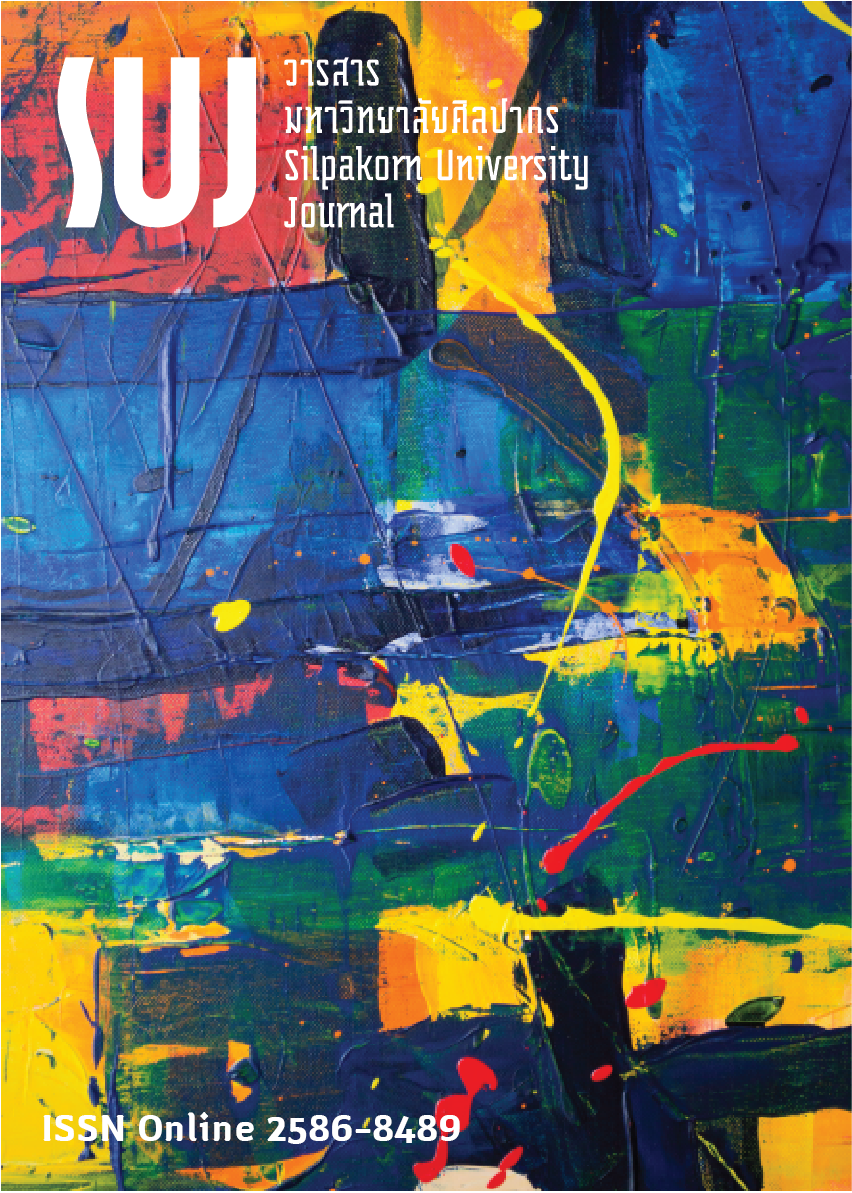ปัจจัยที่มีอิทธิพลต่อความตั้งใจเชิงพฤติกรรมในการใช้เทคโนโลยีเว็บพอร์ทัลของการเรียนการสอนในระบบเปิด Thai MOOC (Influence factors in the behavioral intention of the use of the web portal Thai MOOC educational System)
Main Article Content
Abstract
งานวิจัยนี้มีวัตถุประสงค์เพื่อศึกษาปัจจัยที่มีอิทธิพลต่อความตั้งใจที่จะใช้เทคโนโลยีเว็บพอร์ทัลการเรียนการสอนในระบบเปิด Thai MOOC ซึ่งมีการประยุกต์ใช้แบบจำลองการยอมรับเทคโนโลยี โดยใช้แบบสอบถามเป็นเครื่องมือที่ใช้รวบรวมข้อมูลในการวิจัยจากผู้ใช้งาน จำนวน 400 คน และวิเคราะห์สถิติโดยใช้การวิเคราะห์สถิติเชิงพรรณนา การวิเคราะห์องค์ประกอบเชิงสำรวจและการวิเคราะห์สมการเชิงโครงสร้าง ผลการศึกษาพบว่า ทัศนคติ อิทธิพลทางสังคม และการรับรู้ความสามารถของตนเอง มีอิทธิพลโดยตรงต่อความตั้งใช้เชิงพฤติกรรมในการใช้เทคโนโลยีเว็บพอร์ทัลของการเรียนการสอนในระบบเปิด Thai MOOC โดยมีผลทางบวก นอกจากนี้ ความเปิดกว้าง ความมีชื่อเสียง ความสามารถในการจ่าย ความเหมาะสมของงานและลักษณะของเทคโนโลยี ความเพลิดเพลิน การรับรู้ประโยชน์ การรับรู้ความง่ายในการใช้งาน และความพึงพอใจ ร่วมกันส่งผลทางอ้อมต่อความตั้งใจเชิงพฤติกรรมในการใช้เทคโนโลยีเว็บพอร์ทัลของการเรียนการสอนในระบบเปิด Thai MOOC
This research aims to study influence factors in the behavioral intention to use the web portal of Thai MOOC educational system which has applied the technology acceptance model. Questionnaires were used as a tool to collect data from 400 users. The statistical analytical methods adopted in this research were descriptive statistics, exploratory factor analysis, and structural equation model (SEM) which was used to explain the model. The results revealed that attitude, social influence, and self-efficacy had a significant and direct impact on the behavioral intention to use the web portal of Thai MOOC educational system with positive results. In addition, openness, reputation, affordability, task-technology fit, enjoyment, perception of its usefulness, perception of its ease of use and satisfaction are also simultaneously the indirect influence factors in the behavioral intention to use the web portal Thai MOOC educational system.
Downloads
Article Details
References
Bandura, A. (1982). Self-Efficacy Mechanism in Human Agency. American Psychologist, 37(2): 122-147.
Bandura, A. (1994). Self-Efficacy. Encyclopedia of human behavior, 4: 71-81.
Chen, C. C., Lee, C. H. & Hsiao, K. L. (2017). Comparing the determinants of non-MOOC and MOOC continuance intention in Taiwan: Effects of interactivity and openness. Library Hi Tech, 36(4): 705-719.
Cochran, W.G. (1977). Sampling Techniques. New York: John Wiley and Sons Inc.
Davis, F. D. (1986). A technology acceptance model for empirically testing new end-user information systems: theory and results. Doctoral dissertation, Massachusetts Institute of Technology, Cambridge, Massachusetts, USA.
Delone, W. & Mclean, E. (2003). The DeLone and McLean Model of Information Systems Success: A Ten-Year Update. Journal of Management Information Systems, 19(4): 9-30.
Dishaw, M.T. & Strong, D.M. (1998). Extending the technology acceptance model with task - technology fit Constructs. Information & Management, 36: 9-12.
Duygu, F.C., Nurcan, A. & Sevgi, O.Y. (2018). A Structural Model for Students’ Adoption of Learning Management Systems An Empirical Investigation in the Higher Education Context. Journal of Educational Technology & Society, 21(2): 13-27.
Farahat, T. (2012). Applying the Technology Acceptance Model to Online Learning in the Egyptian Universities. Procedia - Social and Behavioral Sciences, 64: 95-104.
Goodhue, D.L. & Thompson, R.L. (1995). Task-Technology Fit and Individual Performance. MIS Quarterly. 19(2): 213-236.
Joo,Y. J. , So, H. J. & Kim, H. J. (2018). Examination of relationships among students’ self-determination, technology acceptance, satisfaction, and continuance intention to use K-MOOCs. Computers & Education, 122(2018): 260-272.
Kelman, H. C. (1958). Compliance, Identification, and Internalization: Three Processes of Attitude Change. The Journal of Conflict Resolution, 2(1): 51-60.
Kripanont, N. (2007). Examining a Technology Acceptance Model of Internet Usage by Academics within Thai Business Schools. Doctoral dissertation, Victoria University, Melbourne, Australia.
Laverde, A. C., Hine, N. & Martínez-Silva, J. A. (2015). Literature and Practice: A Critical Review of MOOCs. Comunicar, 44(XXII): 9-17.
Ma, L. & Lee, C. S. (2018). Investigating the adoption of MOOCs: A technology-user-environment perspective. Journal of Computer Assistance Learning, 1-10.
Mohapatra, S. & Mohanty, R. (2016). Adopting MOOCs for afforable quality education. Educ Inf Technol, 22: 2027 - 2053.
National Statistical Office. (2017). Demography Population (สถิติประชาการศาสตร์). [Online]. Retrieved November 2, 2018 from http://statbbi.nso.go.th/staticreport/page/sector/th/01.aspx
Oliver, R. L. (1980). A cognitive model of the antecedents and consequences of satisfaction decisions. Journal of Marketing Research, XVII: 460-469.
Park, S. Y. (2009). An Analysis of the Technology Acceptance Model in Understanding University Students’ Behavioral Intention to Use e-Learning. Journal of Educational Technology & Society, 12(3): 150-162.
Park, Y., Son, H. & Kim, C. (2012). Investigating the determinants of construction professionals’ acceptance of web-based training: An extension of the technology acceptance model. Automation in Construction, 22: 377-386.
Shen, J. & Eder, L.B. (2009). Intention to use virtual worlds for education. Journal of Information Systems Education, 20(2): 225-233.
Suwannatthachote, Praweenya and Sophonhiranrak, Samoekan (2017). MOOC standards and practices that are internationally recognized (มาตรฐานและแนวปฏิบัติการเรียนการสอน MOOC ที่ได้รับการยอมรับในระดับนานาชาติ). Bangkok: Office of the Higher Education Commission.
Thailand Cyber University. (2018). Statistics for the TCU. [Online]. Retrieved October 21, 2018 from https://www.thaicyberu.go.th/
Venkatesh, V. (2000). Determinants of Perceived Ease of Use: Integrating Control, Intrinsic Motivation, and Emotion into the Technology Acceptance Model. Information Systems Research, 11(4): 342-365.
Venkatesh, V., Morris, M. J., Davis, G.B. & Davis, F.D. (2003). user acceptance of information technology: toward a unified view. MIS Quarterly, 27(3): 425-478.
Wu, B. & Chen, X. (2017). Continuance intention to use MOOCs: Integrating the technology acceptance model (TAM) and task technology fit (TTF) model. Computers in Human Behavior, 67: 221-232.


